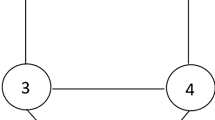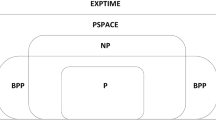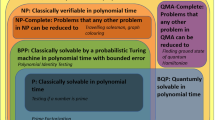Abstract
This study proposes an exact quantum learning algorithm for finding two dependent variables to solve the 2-junta problem. A 2-junta is a Boolean function \(f:{\left\{\text{0,1}\right\}}^{n}\to \left\{0, 1\right\}\) that depends on only 2 out of \(n\) variables. In 2021, Chen proposed an exact quantum learning algorithm for solving the 2-junta problem by performing the function operation \(O\left({log}_{2}n\right)\) times in the worst case. However, our proposed quantum algorithm only requires three function operations in the worst case using the modified black-box function of El-Wazan et al.




Similar content being viewed by others
References
Lu, Z.Q.: The elements of statistical learning: data mining, inference, and prediction. J. of the Roy Stat. Soc. Ser. A. 173(3), 693–694 (2010)
Mossel, E., O’Donnell, R., Servedio, R.P.: Learning juntas. Proc. 35th Ann. ACM Symp. Theo. Comp., 206–212 (2003)
Mossel, E., O’Donnell, R., Servedio, R.P.: Learning functions of k relevant variables. J. Comput. Syst. Sci. 69(3), 421–434 (2004)
Atıcı, A., Servedio, R.A.: Quantum algorithms for learning and testing juntas. Quantum Inf. Process. 6(5), 323–348 (2007)
Floess, D.F., Andersson, E., Hillery, M.: Quantum algorithms for testing Boolean functions. (2010). arXiv:quant-ph/1006.1423
Bernstein, E., Vazirani, U.: Quantum complexity theory. SIAM J. Comput. 26(5), 1411–1473 (1997)
Boyer, M., Brassard, G., Høyer, P., Tapp, A.: Tight bounds on quantum searching. Fortsch Phys. -Prog Phys. 46(4–5), 493–505 (1998)
Ambainis, A., Belovs, A., Regev, O., de Wolf, R.: Efficient quantum algorithms for (gapped) group testing and junta testing. Proc. 27th Ann. ACM-SIAM Symp. Discr. Alg., 903–922 (2016)
El-Wazan, K., Younes, A., Doma, S.B.: A quantum algorithm for testing juntas in Boolean functions.arXiv:quant-ph/(2017). 1701.02143
Chen, C.-Y.: An exact quantum algorithm for testing Boolean functions with one uncomplemented product of two variables. Quantum Inf. Process. 19(7), 213 (2020)
Younes, A.: A fast quantum algorithm for the affine Boolean function identification. The Eur. Phys. J. Plus. 130(2), 34 (2015)
Chen, C.-Y.: An exact quantum algorithm for the 2-Junta problem. Int. J. Theor. Phys. 60(1), 80–91 (2021)
Younes, A., Miller, J.F.: Representation of Boolean quantum circuits as Reed–Muller expansions. Int. J. Electron. 91(7), 431–444 (2004)
Author information
Authors and Affiliations
Corresponding author
Additional information
Publisher’s Note
Springer Nature remains neutral with regard to jurisdictional claims in published maps and institutional affiliations.
Rights and permissions
Springer Nature or its licensor holds exclusive rights to this article under a publishing agreement with the author(s) or other rightsholder(s); author self-archiving of the accepted manuscript version of this article is solely governed by the terms of such publishing agreement and applicable law.
About this article
Cite this article
Chen, CY. A Exact Quantum Learning Algorithm for the 2-Junta Problem in Constant Time. Int J Theor Phys 61, 212 (2022). https://doi.org/10.1007/s10773-022-05198-4
Received:
Revised:
Accepted:
Published:
DOI: https://doi.org/10.1007/s10773-022-05198-4




